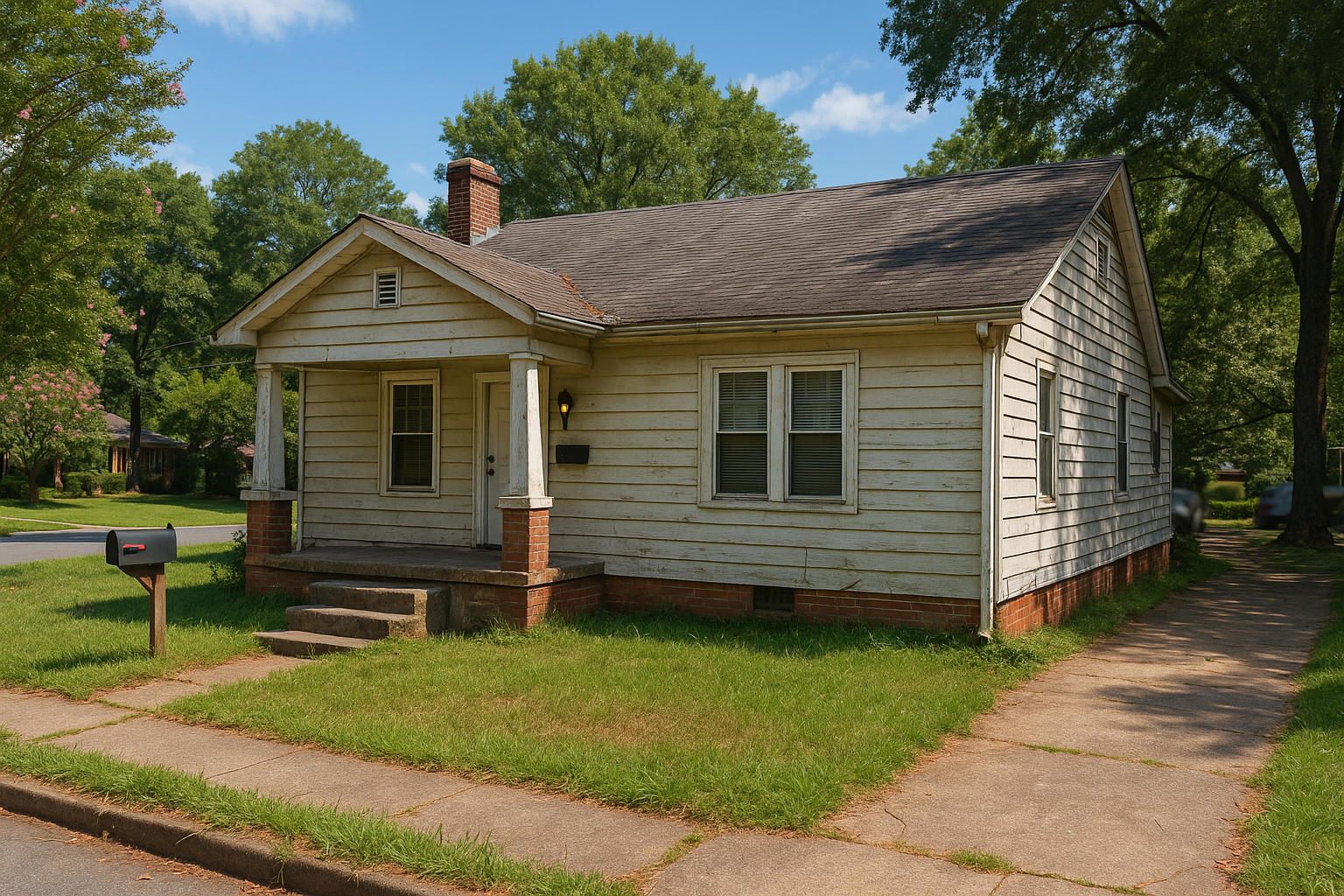Selling a house that’s really in disrepair can be a right overwhelming prospect, especially in a city like Charlotte where home buyers have loads of options and market trends can shift in the blink of an eye. If this is the kind of situation you’re facing and you’re thinking about selling a house that needs a lot of work, it’s worth getting a good grasp on the whole ‘repairs selling’ thing – that is, deciding whether it’s worth sinking more cash into repairs or just selling the place as-is. This guide is here to walk you through the options, guide you on pricing, and give you some local insight that’s relevant to Charlotte home owners. Keep in mind that houses that need a lot of work generally don’t fetch the same price as those that are move-in ready, so getting your pricing right upfront is crucial.
Understand Charlotte’s market before you decide
Before you do anything else, get a clear read on what’s going on in Charlotte’s local market. Right now, Charlotte’s median sale price has held up pretty well compared to other cities, with reports showing prices in the low-to-mid $400,000s and some modest year-over-year gains in certain months. But homes are taking longer to sell than they did at the peak, and we’ve seen an uptick in inventory, giving buyers way more options – and that’s impacting pricing and negotiation power. A few years back, when the seller’s market was going strong, that was a great time for sellers with quicker sales and higher prices. Knowing whether your particular neighbourhood is still in-demand or starting to fall off a bit will play a big role in whether you should splash out on repairs or just sell as-is.

Real options for sellers of houses that need major repairs
There are three pretty practical routes that most sellers take when their property needs a serious fix: put some money into repairs and list it traditionally, sell to a cash buyer or investor without making a single repair, or go hybrid – a few targeted repairs plus a discounted sale price. Lots of sellers are dealing with a fixer-upper, which can be a real draw for buyers who want a renovation project or investment opportunity. Each of these paths has its pros and cons.
Investing in repairs can bring in higher offers, but it needs a cash upfront and time. Home improvements can give your property a bit of a face-lift and make it more attractive to a wider pool of buyers. Cosmetic updates like kitchens, bathrooms, and flooring can make a big difference and help sell the place a bit quicker. But if the property needs major structural work, a full renovation just might not be worth it. Some houses require so much repair work that it’s not even worth your while to fix them up – that’s often the point at which selling as-is becomes a more attractive option. In Charlotte’s ever-changing market, you really need to run the numbers: estimate the repair costs, compare how much you could get for the place after the repairs are done, and see how that compares to an as-is cash offer. Local sales comps and a contractor’s estimate are absolutely essential for this calculation.
Selling as-is is a quick and easy way to get out from under a property that’s a real money pit. Charlotte has a bunch of local cash buyers, investor groups, and national platforms that buy homes as-is for cash and get the whole thing done in no time. These buyers tout convenience: no repairs, no viewings, and a super-quick close. But, of course, this convenience comes with a discount. If your priority is getting out quickly, being certain of your sale price, or avoiding taking on more debt, accepting a fair cash offer might be the smartest move. Make sure you’re using trusted marketplaces or going off local buyer reviews to avoid getting lowballed or scammed.
A hybrid approach gives you some flexibility – you can do a few high-impact repairs for a low cost, then list the place with a clear as-is disclosure and a pricing strategy that takes into account what’s still a bit wonky. This approach can attract buyers who are willing to shell out a bit more than investors but not as much as a fully renovated place would fetch.
When choosing an agent to help you out, look for someone with experience selling fixer-uppers – they’ll know how to handle pricing, disclosures, and marketing to the right crowd of buyers. Ultimately, your goal is to make a profitable sale by finding a balance between the cost of doing repairs and an effective pricing strategy.
How to evaluate repair vs. sell-as-is decisions
Start by getting a realistic inspection done by a licensed inspector or experienced contractor. What you’re looking for is a prioritized list of issues and ballpark prices. It’s crucial to catch major problems early on, like major structural issues, safety hazards, or problems with plumbing or electricity – these can really impact how marketable your property is, and can even kill financing options. If the repairs are minor and cost-effective relative to the increase in sale price, they might just be worth doing. But if the cost of making the house market-ready is going to eat up all of the potential gain, selling as-is is definitely worth considering – especially if you’re thinking about whether it makes financial sense to pour money into repairs or just cut your losses and sell as-is.Next, compare the offers side by side – its a whole lot easier when you can see them all laid out at once. Let’s take an example – repairs are gonna cost $30,000. But if the sale price after repair jumps up by $40,000, that net gain is just a paltry $10,000 – that’s before you factor in all the other costs like agent fees and carrying expenses. To get a realistic price, you need to know the actual cost of repairs and those ongoing expenses like property taxes and maintenance. That way you can avoid getting into a bidding war where everyone’s fighting over pennies.
How to maximize value when selling as-is
If you decide to sell as-is, you can still save your bacon by being smart about it. First off, be upfront and honest. Disclose everything and make sure it’s all in writing. You want to build trust with the buyers, not create a whole bunch of headaches down the line. Second, tidy up smartly. Don’t waste your time on big repairs, just focus on making the place look good and giving buyers an idea of its potential. A quick scrub and some decent landscaping can make the place look like a new person altogether. Even small things like fresh paint can make a big difference.
Third, get any reports you can that will help convince buyers that the place is in decent nick. A recent inspection report or a good estimate for any necessary repairs can go a long way in getting you a better offer. And finally, shop around to see what other buyers are offering. Charlotte’s got plenty of cash buyer services and local investors who’ll give you a fair price and close the deal quick. Some will even give you the flexibility to close when it suits you best – just make sure to do your research and only go with people who are reliable.

Working with cash buyers in Charlotte
If you’re selling your house as-is in Charlotte, working with cash buyers can be a quick and smart way to get it sold. They’re not concerned with getting loan approvals, so you can expect to close in just a matter of days or weeks – a whole lot faster than if you were trying to sell to a buyer who’s waiting on a mortgage. Cash buyers may offer a lower sale price, but you’ll avoid all the hassle and expense of making big repairs yourself. And with experienced agents to guide you, you can get a fair price and make sure you’re not getting ripped off.
Offering repair credits: a strategic alternative
If you want to attract more buyers without breaking the bank on repairs, consider offering repair credits when you sell as-is. That way buyers can do the repairs in their own time, and you can still get a good price for your house. It’s especially useful in a market like Charlotte where buyers are competing for properties. By offering repair credits, you’re giving buyers the flexibility to do things on their own terms – and that can get you a higher sale price and a faster sale.
But if you’re not sure how to do it right, work with an experienced agent who knows the market and can help you navigate the process. They can help you figure out which repairs are best to offer credits for and how much to offer, so you get the best possible deal. And when it comes time to negotiate with buyers, they’ll be right there to look out for you.
Negotiation tips and pricing guidance
Price your home so it reflects its condition but with a bit of wiggle room for negotiations. Overpricing a problem property is a surefire way to end up with a stale listing and eventual price reductions that scream “we’re desperate”. On the other hand, undervaluing it can get the house sold in no time but leaves you with less cash in your pocket when you finally walk away – you end up losing money by selling for less than what your home is actually worth.
If you’re listing, work with an agent who has some serious experience selling fixer-uppers in Charlotte – they’ll know just how to paint the property in the best possible light, highlight the neighbourhood’s best features, and attract buyers who actually care about the place. Even a few small updates or repairs can make a huge difference in the negotiation process and get more butchers at the door.
Keep one thing in mind though: some conventional loan buyers have much stricter requirements for property condition than those using alternative financing, so that’s worth bearing in mind.
When you’re negotiating with a cash buyer, ask them to break down their offer and any fees associated with it. Make sure you know if they’re going to take any other costs out of the sale you don’t know about – like any unseen repairs they might discover after inspection. And if multiple buyers are interested, use that as leverage to get a better deal – like a higher price, a quicker closing or a small escrow for repairs that you control.There are some strategies that can help you sell quickly, too – if that’s your main priority. And always make sure to have a real estate attorney look over any contracts you’re signing – just in case.
Closing the sale: what to expect in Charlotte
Selling a house as is in Charlotte can be a little tricky, but understanding what’s coming down the pike can help you avoid any nasty surprises and make sure the whole thing goes off without a hitch. When you accept an offer, the buyer will want to do an inspection to see if there are any major repairs or defects that they need to know about. And as the seller, you’ll need to provide standard disclosure forms showing any known problems with the property. Honesty is key here – the more upfront you are, the less chance of last minute negotiations.
In Charlotte, the typical timeline for closing a house as is is between 30 to 60 days – this depends on the buyer’s financing and how complicated the sale is. If you’re working with a cash buyer, it usually all moves much faster, since there are no appraisal contingencies to slow things down. Your agent will guide you through every step – from dealing with the inspection report to finalising paperwork and coordinating with attorneys and title companies.
To make sure you’re getting a fair price, do some research on comparable sales in your neighbourhood and think about offering repair credits if you want to attract more buyers or get a better deal. By getting organised, working with a good agent and being upfront about your home’s condition, you can close the sale quickly and get the best possible price for your home – even when selling a house as is with lots of repairs.
Things to do Next – A Practical Checklist for Charlotte Sellers
First things first: gather some data – this includes recent sales in your area, a contractor’s estimate for repairs and at least one inspection. Now, decide whether you can afford to fix the most critical issues or if selling as is is better for your time and money. If selling as is, research some reputable cash buyers and platforms that’ll give you multiple offers from people you can trust. If listing on the MLS, partner with an agent who knows the drill and price the place competitively with all the condition disclosures out in the open.
Timing is also worth thinking about – Charlotte’s got a rising inventory at the moment, so some buyers are in a pretty strong position to negotiate in certain areas of the city. That means well-priced homes still sell, but if you’re selling a house with loads of issues, it might be a bit harder.
Conclusion
You don’t have to take a lowball offer just because you need to sell a house with loads of repairs. With some good advice, a bit of maths and some careful consideration of your options, you can protect your equity and choose the sale that best fits your needs. Whether it’s selective repairs, a full-on renovation or a quick cash sale to a reputable buyer, the key is to be upfront and document everything so you’re not caught out at the last minute. If you do it right, you can sell your house with repairs and come out on top. Check our home selling process to know more.


But it gets better:
You can sell fast without an agent with no rush to move. You don’t have to move out right away; you can stay in your home for awhile until you locate another home.
We are confident that we can help you today – regardless of the situation.

